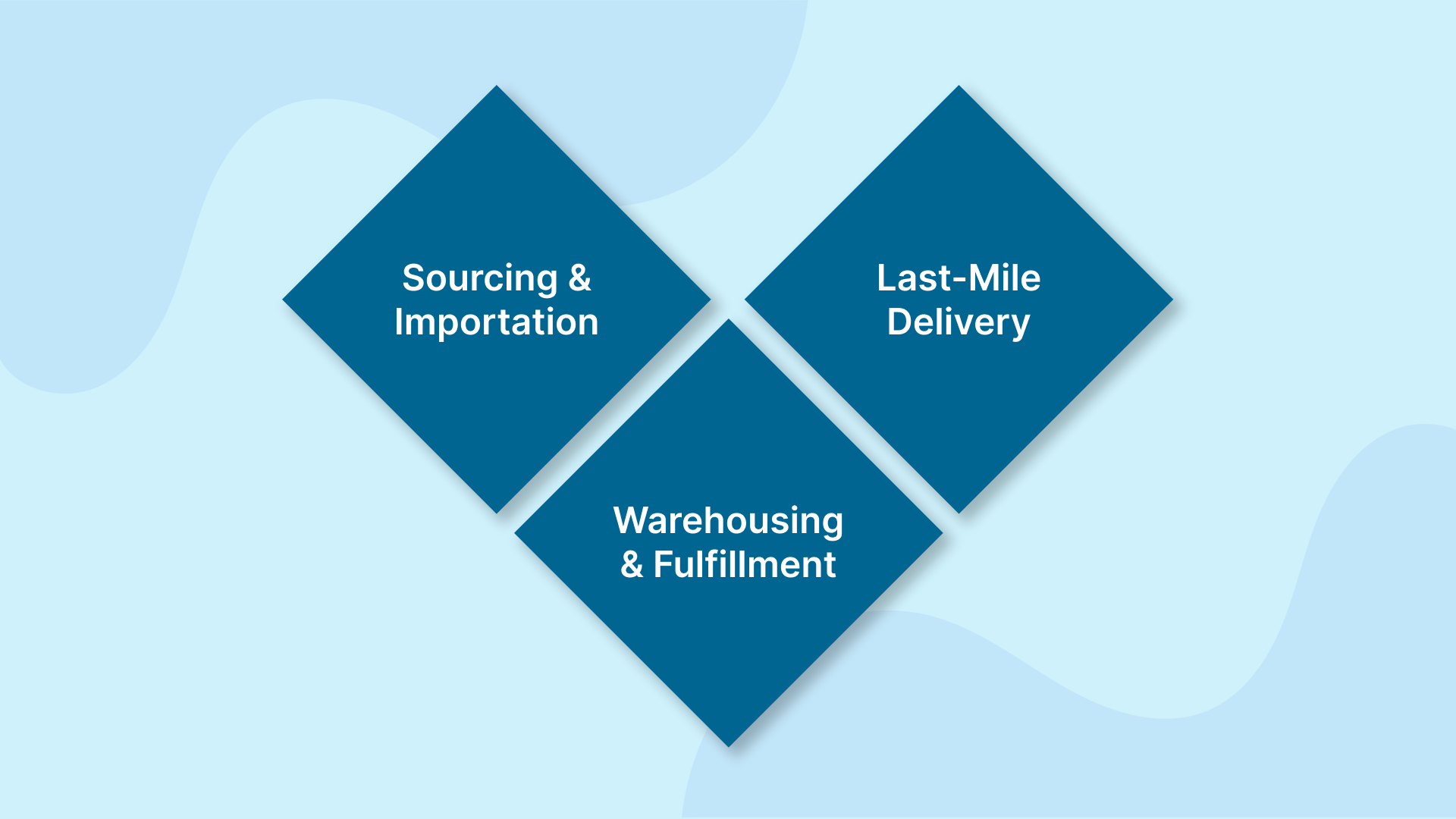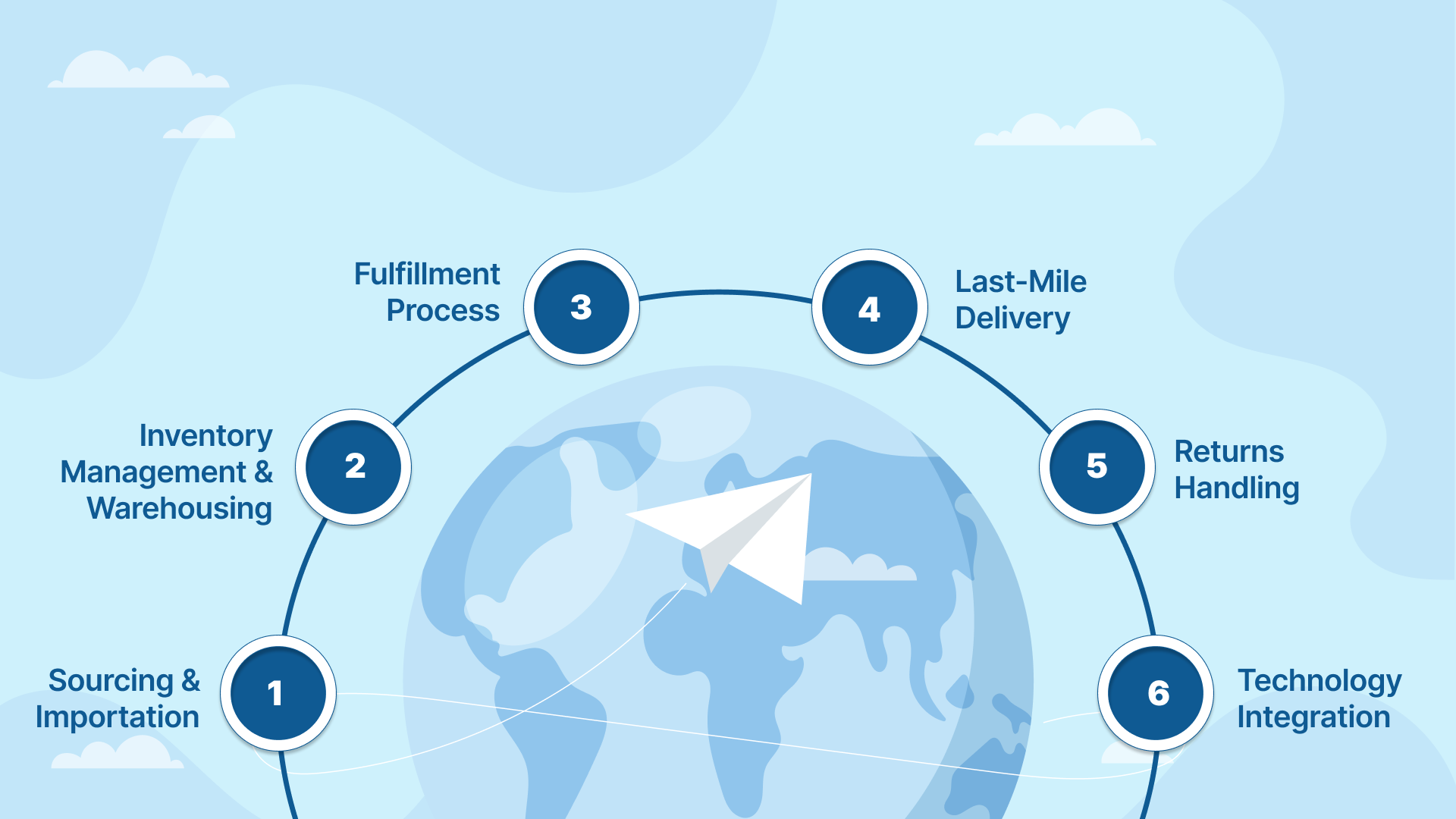The logistics sector in the Philippines is expanding rapidly. Valued at USD 30.0 billion in 2024, it is projected to reach USD 40.0 billion by 2033, with a compound annual growth rate (CAGR) of 3.6%. This growth presents both opportunities and challenges for you, especially if you’re involved in e-commerce, imports, warehousing, and distribution.
Managing supply operations efficiently is critical to your business’s success. Every stage of the process, sourcing, customs clearance, warehousing, fulfillment, and delivery, directly impacts your operational efficiency, customer satisfaction, and costs. Delays or inefficiencies at any point can lead to increased expenses and missed opportunities.
This guide covers the key components of supply operations, breaking down the processes involved and emphasizing the importance of optimization. By managing your supply chain, you can reduce costs and gain the flexibility to scale your operations, enabling your business to grow in a fast-growing market.
Supply operations refer to the comprehensive set of processes that manage the flow of goods from the point of origin to the final customer. These operations encompass everything from sourcing and importing products to storing, fulfilling orders, and ensuring timely delivery. For your business, efficient supply operations are essential for maintaining smooth daily functions and meeting customer expectations while controlling costs.
When supply operations are well-managed, your business can scale effectively, minimize delays, and maintain a competitive edge. Let’s look at the key components that make up a successful supply operation.

Managing the flow of products through your business requires a deep understanding of several critical components. Each step must be executed efficiently to avoid bottlenecks, control costs, and provide a smooth experience for your customers. Here’s an overview of the essential components of supply operations:
Sourcing and importing products is at the core of your supply operations. This involves identifying suppliers who meet your quality, pricing, and delivery standards. It also requires managing the complexities of the import process to ensure smooth customs clearance, timely delivery, and compliance with local regulations. Any delay or issue here can create a ripple effect, causing disruptions.
Here’s what effective sourcing and importation entail:
Once goods are sourced and imported, they need to be stored efficiently to prevent overstocking or stockouts. Warehousing plays a critical role in ensuring that products are readily available when orders are placed. Additionally, the fulfillment process, picking, packing, and shipping orders, is where delays can occur if not optimized.
To manage this aspect of your supply operations, focus on:
The final and most visible step in your supply operations is last-mile delivery. This process refers to getting the product from the warehouse to your customer’s door. This is often where the customer’s experience peaks or declines, as they expect timely and accurate deliveries.
To master last-mile delivery, consider these aspects:
By managing these components effectively, your supply operations will run more smoothly and create a better experience for your customers. Each stage plays a critical role in improving operational efficiency and reducing costs. Now that we’ve explored the key components, let’s look at how optimizing these processes can benefit your business.
The e-commerce sector is growing rapidly, with sales expected to reach USD 24 billion by 2025, driven by 73 million active online users. As demand for faster delivery and better service increases, your business’s supply operations must keep pace. Efficient supply chain management is quite essential for survival in this growing environment. Here’s why:
Efficient supply operations directly impact your bottom line. Your business can reduce operational costs and maximize profit margins by eliminating inefficiencies in sourcing, warehousing, and delivery. Streamlined processes mean fewer delays and less waste, leading to significant savings. With cost-effective management of resources, you can reinvest those savings into growing your business.
Operational efficiency is crucial for meeting customer expectations and scaling your business. Speed and accuracy in fulfilling orders directly impact customer satisfaction. Efficient operations allow your business to process higher orders without sacrificing quality, positioning your business to scale effectively as demand grows.
In a complex regulatory environment, staying compliant with customs, import/export laws, and industry standards is non-negotiable. Efficient supply operations help your business stay ahead of regulatory requirements, minimizing the risk of fines, delays, or disruptions. By ensuring compliance, your business maintains smooth operations and protects its reputation.
As demand grows, efficient supply operations provide the flexibility your business needs to scale without adding unnecessary overhead. When your processes are optimized, it’s easier to handle larger order volumes, increase product range, or expand to new markets, all without increasing operational costs in proportion to growth. This scalability ensures that your business can handle future growth easily.
Understanding the importance of efficient supply operations lays the foundation for growth, but what really drives success is how well each process is managed. Once the core principles are in place, it’s time to implement and optimize the steps that allow your business to deliver effectively.
Also Read: Supply Chain Examples and Effective Strategies Explained

The evolution of supply chain management is accelerating in the Philippines, particularly driven by advancements in digitalization and automation. The ability to manage each process, from sourcing to last-mile delivery, directly impacts cost control, operational efficiency, and customer satisfaction.
Below, we’ll explore the critical steps in supply operations and how they can be managed for maximum efficiency.
Sourcing and importation are the foundation of any supply operation. With the Philippine market’s increasing reliance on dual and multi-sourcing strategies to reduce dependency on volatile global networks, selecting the right suppliers and managing imports efficiently is essential. Businesses are using digital tools and automated customs clearance to ensure faster, more accurate deliveries and minimize delays at borders.
This shift toward localization reduces lead times and mitigates the risks of international logistics disruptions, ensuring a more resilient supply chain that can better handle global disruptions.
Managing inventory efficiently is key to avoiding stockouts or overstocking, both of which can lead to lost sales or excessive holding costs. In the Philippines, supply chain management software adoption is increasing, with the market projected to reach USD 29.71 million by 2025. These software solutions provide real-time inventory visibility, demand planning, and better integration with enterprise systems, ensuring inventory levels are optimized.
Moreover, warehouse automation is cutting down manual errors, speeding up processing times, and improving accuracy in stock management. With real-time data tracking now becoming standard, businesses can maintain greater control over their stock, which contributes to faster and more efficient order fulfillment.
Efficient order fulfillment is vital for maintaining customer satisfaction. With the growing rise of e-commerce and direct-to-consumer models, optimizing this process has never been more important. Digital tools are now being used to automate picking and packing processes, which enhances accuracy and speeds up the delivery cycle. Integrating AI and robotics improves the speed of order processing, reduces errors, and allows businesses to scale their fulfillment efforts easily.
The rise of e-commerce has brought last-mile delivery into focus, with consumers demanding faster and more reliable delivery services. In the Philippines, businesses are investing in robust last-mile solutions, such as using AI-powered route optimization tools to minimize delays and ensure on-time delivery. The shift toward direct-to-consumer models is putting pressure on businesses to adapt their supply chains to deliver quickly and reliably, especially in densely populated areas.
This is where localization has a significant impact businesses are using near-shoring and localized distribution hubs to reduce delivery times and improve control over the last-mile process.
With e-commerce growth comes an increase in returns, making this part of the supply chain crucial. Efficient returns handling can enhance customer loyalty and reduce the cost impact of returns. Businesses focus on optimizing reverse logistics, ensuring that products can be quickly inspected, restocked, or disposed of as needed. Streamlined returns management processes also help businesses keep inventory up-to-date and reduce the financial strain caused by returned goods.
The integration of digital tools and automation has transformed the Philippine supply chain sector, especially in warehousing, logistics, and inventory management. In 2024, businesses in the region are increasingly using AI and machine learning to improve accuracy, optimize routes, and automate repetitive tasks. This technology-driven approach reduces manual errors, improves productivity, and enables businesses to respond more quickly to changes in demand.
Next, let’s explore the key strategies to help businesses like yours build a resilient and efficient supply chain, ensuring long-term growth and success.
Also Read: Comprehensive Guide to Logistics Planning Strategies
Efficiently managing your supply operations doesn’t happen overnight. It requires a clear strategy, constant monitoring, and the flexibility to adapt to shifting demands. Here are the key best practices that can transform how your supply chain operates:
To maintain optimal inventory levels, it’s critical to have an accurate picture of future demand. You can predict product demand more effectively by using historical data, market trends, and seasonality patterns. This allows you to avoid overstocking, which ties up capital, or understocking, which results in lost sales. Accurate demand forecasting ensures that your supply chain is prepared to meet customer needs without wasting resources.
Building long-term, reliable relationships with your suppliers is key to ensuring the smooth flow of goods into your business. This involves clear communication, timely payments, and fostering a sense of partnership. When you invest in these relationships, suppliers are more likely to prioritize your orders, meet deadlines, and provide support when challenges arise, leading to better overall supply chain performance.
Automation tools in warehousing, inventory management, and order fulfillment are essential for reducing human error and improving speed. Automated systems can track inventory levels in real-time, schedule reorders, and even manage returns more efficiently. By reducing manual processes, your business can reduce costs, improve accuracy, and manage operations at scale.
Supply chains are not static. As market conditions, customer preferences, and technology evolve, so should your supply operations. Regularly reviewing your processes, measuring performance against set benchmarks, and refining operations based on these insights ensures that you stay ahead of the curve. Continuous improvement is the key to maintaining a competitive edge and achieving long-term success.
Supply chain risks are inevitable, from natural disasters to supply disruptions. Having a robust risk management strategy in place helps your business stay resilient in the face of these challenges. This includes diversifying suppliers, building contingency plans, and using technology to track potential risks in real-time. The goal is to ensure that even when things don’t go as planned, your business can adapt quickly without significant damage to your operations.
By integrating these best practices into your supply chain management, your business can improve its operational efficiency, reduce costs, and enhance its ability to scale.
Inspire Solutions is committed to improving the efficiency of your supply chain with practical, results-driven services. Inspire helps businesses like yours reduce costs, increase operational efficiency, and enhance customer satisfaction by focusing on key areas of your supply operations. Here’s how Inspire Solutions supports each crucial part of your supply chain:
By partnering with Inspire Solutions, your business gains access to a comprehensive suite of services that optimize every part of your supply operations. From sourcing to delivery, Inspire ensures that each step is managed with care and precision, helping your business stay competitive, efficient, and customer-focused.
Ready to enhance your supply chain operations? Get a quote today and discover how Inspire Solutions can manage your processes, reduce costs, and improve overall efficiency.
Efficient supply operations are crucial for your business’s growth and success in today’s competitive market. As the logistics sector in the Philippines continues to grow, businesses like yours that manage operations and stay responsive to industry changes will be better positioned for long-term success.
Inspire Solutions is here to help you optimize your supply chain. With a focus on real-time data and practical solutions, Inspire can help your business improve operations, reduce costs, and scale effectively.
Ready to improve your supply operations and move your business forward? Schedule a meeting with our team today to discover how Inspire Solutions can help you minimize inefficiencies and explore new growth opportunities.